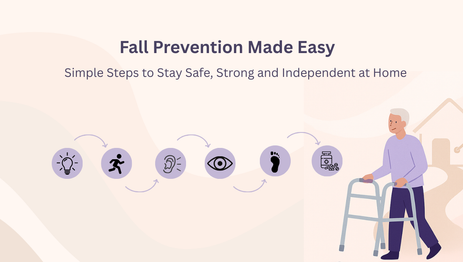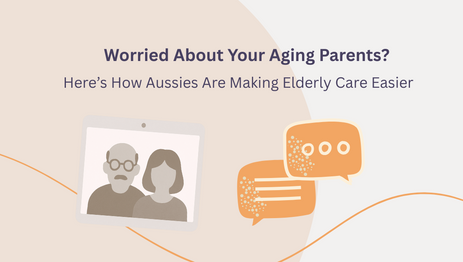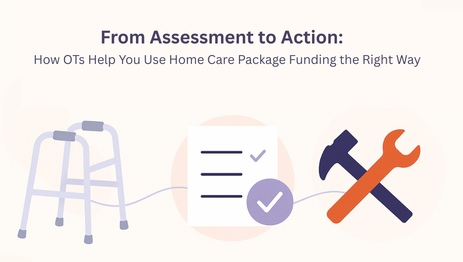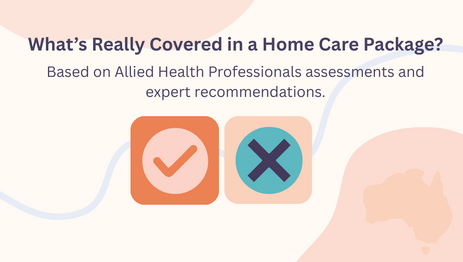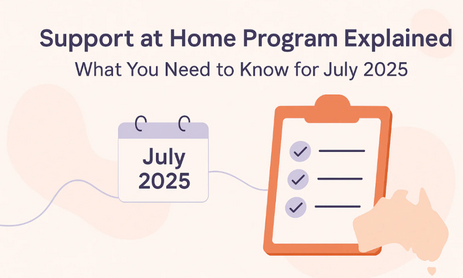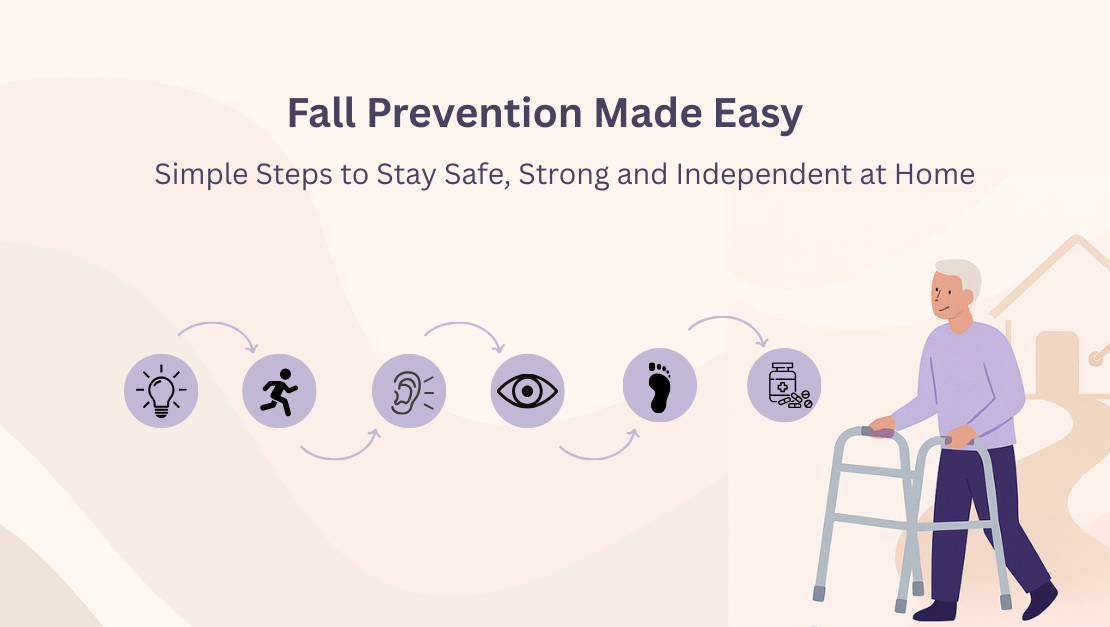
Safe Steps for Seniors and Families
💡 Why Fall Prevention Matters for Older Adults
Did you know that 1 in 3 Australians over 65 experiences a fall each year? And that many of these falls lead to serious injuries that impact independence and quality of life?
But here’s the good news: most falls are preventable.
Whether you're a concerned family member or an older adult yourself, this guide will show you how to:
-
Make your home safer
-
Strengthen your balance and mobility
-
Support your vision, hearing, and bone health
-
Work with trusted professionals who can help
Let’s explore the top fall prevention strategies that empower older Australians to stay active, safe, and independent.
🏡 1. Home Safety: Create a Fall-Free Environment
A few smart changes around the home can dramatically reduce fall risks:
✅ Remove loose rugs, cords, and clutter
✅ Add non-slip mats in bathrooms and kitchens
✅ Install grab rails and handrails along stairs and in the shower
✅ Improve lighting in hallways, entries, and near beds
✅ Use ramp access instead of steps where needed
🛠️ Pro Tip: Ask your GP for a referral to an Occupational Therapist who can do a home safety assessment and recommend modifications that may be funded through My Aged Care.
🏃♂️ 2. Exercise: Strengthen Your Body, Improve Balance
Regular movement builds the strength and coordination needed to prevent falls.
Great options include:
-
Tai Chi – Linked to a 37% reduction in falls
-
Group strength classes (like Summit’s Telehealth program)
-
Balance exercises such as standing on one foot or walking heel-to-toe
-
Gentle yoga or Pilates to increase flexibility
Need a structured plan? Join a local falls prevention program or ask a physiotherapist for a personalized plan.
👂 3. Hearing & Balance: Don’t Overlook the Link
Hearing loss has been linked to a higher risk of falls, especially in older adults. Why?
When hearing declines, the brain uses more energy to listen—leaving less attention for balance and coordination.
📌 A Johns Hopkins study found even mild hearing loss triples fall risk.
➡️ If you haven’t had a hearing test recently, now is the time. Book an appointment with an audiologist or speak to your GP.
🌞 4. Bone Health & Vitamin D
Strong bones are essential for reducing the severity of injuries from falls.
Vitamin D helps your body absorb calcium and supports muscle and bone strength. But as we age, our skin produces less vitamin D from sunlight.
🔎 Aim for vitamin D levels above 60 nmol/L
🥗 Eat foods rich in calcium (e.g., leafy greens, dairy)
🌞 Get 10–30 minutes of sun exposure daily, or ask your GP about supplements
📖 Read Healthy Bones Australia's vitamin D advice
👓 5. Vision: Keep Your World in Focus
Blurry vision, poor depth perception, or outdated glasses can cause missteps and accidents—especially on stairs or uneven ground.
👀 Have a comprehensive eye exam at least once every two years
📏 Ask about lens changes for low-light or glare sensitivity
🕶️ Use adequate lighting and remove obstacles in walking areas
Book with your local optometrist or visit Optometry Australia to learn more.
🦶 6. Foot Health: Support Starts at the Ground
Foot pain, arthritis, or improper footwear can throw off balance and increase fall risk.
👟 Choose well-fitted, non-slip shoes with firm soles
🦶 Do foot and ankle strengthening exercises
🩺 Visit a podiatrist to manage bunions, nerve issues, or toenail concerns
📖 Podiatry Australia’s guide to senior foot care
🤝 7. Your Care Team: You're Not Alone
You don’t have to manage fall prevention alone.
Talk to:
-
Your GP – for referrals and fall risk assessments
-
Physiotherapists – for strength and mobility programs
-
Occupational Therapists – for home safety and equipment
-
Allied Health Assistants – for regular movement and support
-
Care Coordinators – to arrange funded in-home services
Fall Prevention Is a Commitment to Quality of Life
Preventing falls isn’t just about checklists and mats. It’s about:
-
Staying active
-
Keeping your independence
-
Living confidently at home
These steps, while simple, create a life that feels safe, supported, and empowered.
Summit Health Solutions: Your Partner in Fall Prevention
At Summit Health Solutions, we support older Australians to stay strong, mobile, and safe at home.
Our fall prevention services include:
-
Occupational Therapy assessments
-
Home safety recommendations
-
Telehealth exercise classes
-
Physiotherapy and AHA sessions
-
Foot and nail care
We understand that aging comes with change—but it doesn’t have to mean giving up control.
📞 Call us today on 1300 315 315

